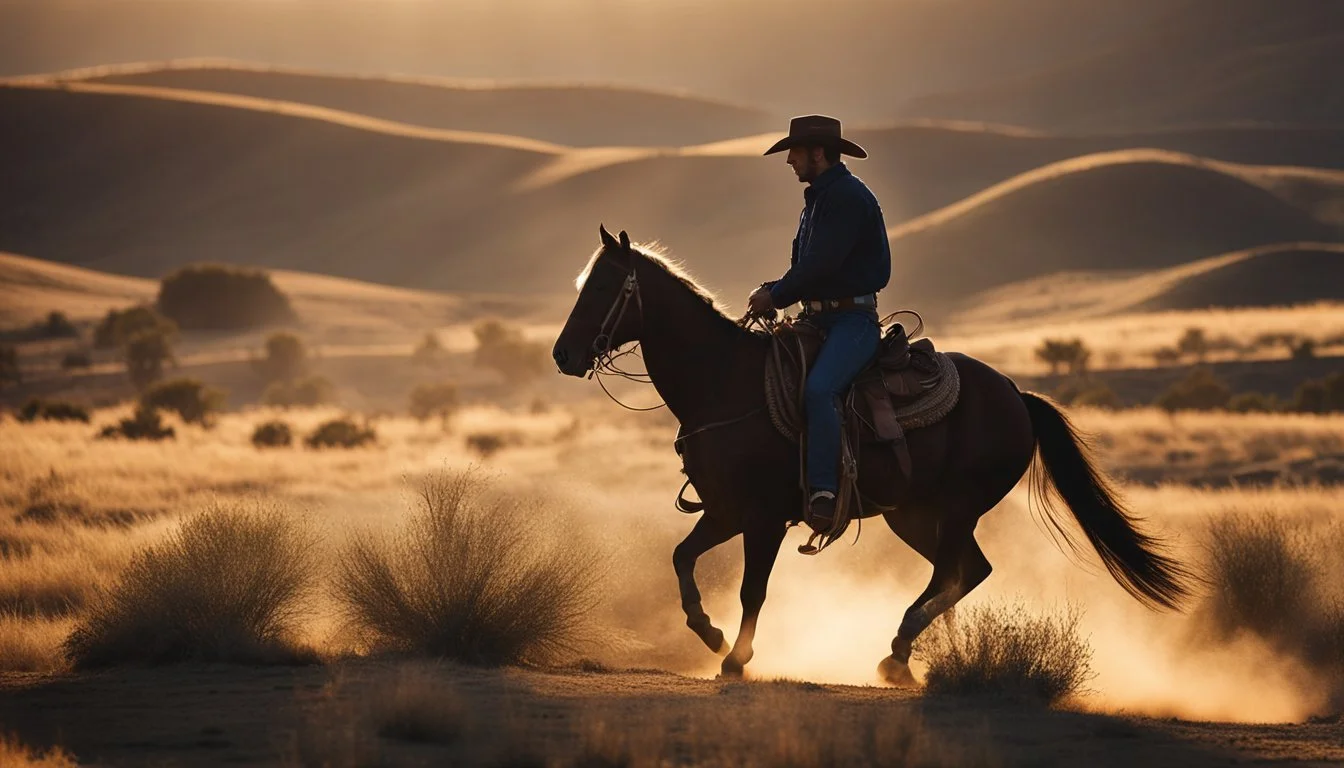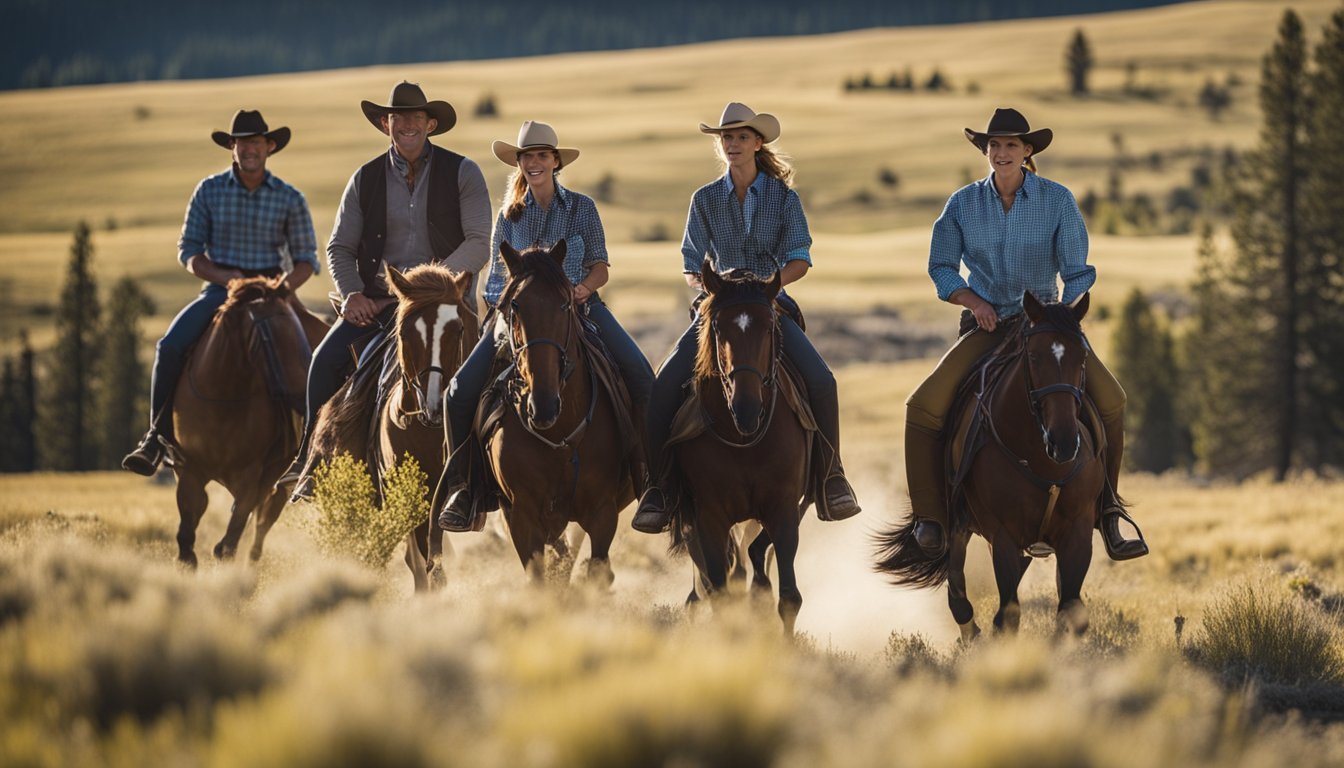What If Roarke Morris Lived? Yellowstone's Shocking Alternate Reality Revealed
Roarke Morris, the cunning antagonist from Yellowstone season 3, met a shocking demise in the season 4 premiere. As a representative of Market Equities, he posed a significant threat to the Dutton family's ranch and way of life.
If Roarke had survived, the dynamics of Yellowstone would have drastically changed, potentially leading to an even more intense conflict between Market Equities and the Duttons. His survival could have escalated the corporate encroachment on the ranch, forcing John Dutton and his family to employ more extreme measures to protect their land.
Roarke's continued presence would have likely complicated Beth Dutton's professional life further. Their ongoing trade war and battle of wits could have reached new heights, providing viewers with more intense confrontations and strategic maneuvers. The possibility of Roarke surviving opens up intriguing storylines and raises questions about the future of the Yellowstone ranch.
Character Analysis: Roarke Morris
Roarke Morris emerged as a formidable adversary for the Dutton family in Yellowstone. His role as a ruthless businessman and Josh Holloway's nuanced portrayal added depth to the character's impact on the series.
Roarke's Role in Yellowstone
Roarke Morris entered Yellowstone in Season 3 as a rancher and stockholder for Market Equities. He quickly established himself as a primary antagonist, setting his sights on acquiring John Dutton's land.
His character represented the threat of corporate interests encroaching on the Dutton's way of life. Roarke's cunning and resources made him a dangerous opponent, capable of challenging the family on multiple fronts.
In Season 4, Roarke's role shifted as he became entangled in a trade war with Beth Dutton. This conflict showcased his adaptability and determination as an antagonist.
Josh Holloway's Portrayal
Josh Holloway brought a sophisticated edge to Roarke Morris, distinguishing him from previous Yellowstone villains. His performance balanced charm and menace, creating a complex character.
Holloway's portrayal highlighted Roarke's confidence and cool demeanor, making him a memorable addition to the cast. His chemistry with other actors, particularly in confrontations with the Duttons, added tension and intrigue to the series.
Despite Roarke's brief tenure on the show, Holloway's acting ensured the character left a lasting impression on viewers and the Yellowstone narrative.
Narrative Impact
Roarke Morris's survival would reshape Yellowstone's storyline, altering character dynamics and power structures within the show's universe.
Consequences of Roarke's Survival
Roarke's continued presence would intensify the conflict between Market Equities and the Dutton family. His survival could lead to more aggressive tactics against the Dutton Ranch, forcing John Dutton to employ new strategies to protect his legacy. Beth Dutton might face a formidable opponent in the corporate arena, potentially leading to high-stakes business confrontations.
The rancher's way of life would face increased threats, with Roarke pushing for land development and modernization. This could result in alliances shifting among secondary characters, as some might be tempted by Roarke's promises of progress and profit.
Shifts in Power Dynamics
Roarke's survival would likely disrupt the balance of power in the Yellowstone universe. His influence could extend beyond Market Equities, potentially attracting other powerful entities to challenge the Duttons' control over the region.
John Dutton might need to reassess his alliances and seek new partnerships to counter Roarke's growing influence. This could lead to unexpected collaborations or rivalries among characters who previously had limited interaction.
Rip Wheeler's role might evolve, requiring him to adapt his methods to combat a more sophisticated threat. The entire Dutton family would need to present a united front, possibly leading to increased cooperation among siblings who often find themselves at odds.
Plot Development
Roarke Morris's survival would have significantly altered Yellowstone's storyline, creating new conflicts and power dynamics. His continued presence would have intensified the battle for land and resources in Montana.
Alternative Story Arcs
Roarke's survival could lead to a more complex rivalry with the Duttons. Instead of a quick death, he might face legal consequences for his actions against the family. This could result in a courtroom drama subplot, showcasing the intricate legal battles over land rights in Montana.
Market Equities might retain a stronger foothold in the area with Roarke at the helm. His expertise in land acquisition could pose a greater threat to the Dutton ranch, forcing John and Beth to devise more sophisticated strategies to protect their legacy.
Roarke's near-death experience from the rattlesnake bite might change his perspective. He could become a more cautious opponent or develop a personal vendetta against Rip Wheeler, adding a layer of tension to future encounters.
Roarke's Continued Schemes
With Roarke alive, Market Equities would likely intensify its efforts to acquire the Dutton ranch. He might employ more aggressive tactics, such as manipulating local politicians or exploiting environmental regulations to pressure the Duttons.
Roarke could form alliances with other Dutton enemies, creating a formidable coalition against the family. This might include partnering with disgruntled ranch hands or rival ranchers who resent the Duttons' power and influence in the region.
His survival might also lead to internal conflicts within Market Equities. Roarke's failure to secure the Dutton land could result in power struggles within the company, potentially introducing new corporate villains to the series.
Character Relationships
Roarke Morris's survival would significantly alter the dynamics between key players in Yellowstone. His continued presence would reshape alliances and intensify rivalries within the show's complex web of relationships.
Roarke and the Duttons
Roarke's antagonistic relationship with the Dutton family would remain a central conflict. John Dutton would view Roarke as a persistent threat to his ranch and legacy. Beth Dutton, known for her fierce protection of family interests, would likely escalate her tactics against Roarke.
Jamie Dutton might find himself caught between loyalty to his family and potential opportunities presented by Roarke's influence. Kayce Dutton would remain wary of Roarke's intentions, potentially leading to more direct confrontations.
Alliances and Enemies
Roarke's survival could lead to strengthened alliances with other adversaries of the Duttons. He might form a more robust partnership with Market Equities, particularly with Willa Hayes.
Thomas Rainwater could see Roarke as either a potential ally against the Duttons or a new threat to his own interests. This dynamic might create a shifting landscape of allegiances.
Roarke's continued presence would likely draw in new players to the power struggle, expanding the network of allies and enemies. His business acumen and resources would make him a formidable long-term opponent in the battle for control of the Yellowstone ranch.
Themes and Symbolism
Roarke Morris's survival would have altered key symbolic elements in Yellowstone. His character embodied the clash between modern corporate interests and traditional ranching values.
Man vs Nature
Roarke's potential survival could have deepened the man versus nature theme. His corporate approach to land acquisition stood in stark contrast to the Duttons' connection with the Montana landscape. Yellowstone Ranch symbolizes a harmonious relationship with nature, while Roarke's vision represented exploitation for profit.
The use of venom to eliminate Roarke highlighted nature's power over human ambition. Had he survived, the struggle between corporate greed and natural preservation would have intensified. This survival might have led to further exploration of environmental themes and the consequences of unchecked development on pristine wilderness.
The Cowboy Ethos
Roarke's character challenged the cowboy ethos central to Yellowstone's narrative. His survival would have prolonged the conflict between modern business practices and traditional ranching values. The Montana ranch lifestyle, embodied by the Duttons, represents a legacy of hard work, honor, and respect for the land.
Roarke's continued presence would have further tested the resilience of this cowboy philosophy. His corporate tactics and disregard for local customs would have provided a persistent foil to the ranching way of life. This contrast could have deepened the show's exploration of changing rural dynamics and the struggle to preserve a vanishing lifestyle in the face of progress.
Economic Elements
Roarke Morris's survival would intensify the clash between corporate interests and rural traditions in Montana. His continued presence would escalate land disputes and development plans.
Corporate vs Rural Conflict
Market Equities, with Roarke at the helm, would persist in their aggressive expansion strategy. The company's focus on transforming rural Montana into a bustling tourist destination would remain unwavering.
Roarke's expertise as a hedge fund manager would drive sophisticated financial maneuvers. These tactics could include manipulating stock prices and leveraging economic pressures against local ranchers.
The Dutton Ranch would face mounting challenges from Market Equities' deep pockets and corporate influence. This conflict would highlight the broader struggle between traditional ways of life and modern economic development.
The Fight for Land
Roarke's survival would mean an ongoing battle for control over the Yellowstone ranch and surrounding areas. Market Equities' plans for an airport development would continue to threaten the region's landscape.
The land developer's persistence would likely lead to more aggressive acquisition attempts. Roarke might explore legal loopholes, political alliances, or economic incentives to sway landowners.
Montana's natural beauty would remain at the center of this tug-of-war. Roarke's vision of a commercialized paradise would clash with the Duttons' desire to preserve their ancestral lands and way of life.
This prolonged conflict would raise questions about sustainable development, property rights, and the future of rural America in the face of corporate expansion.
Representations of Survival
Roarke Morris's hypothetical survival in Yellowstone would have significant implications for the show's dynamics and character relationships. His continued presence would reshape power struggles and alliances within the series.
Adaptation and Resilience
Roarke Morris's survival would showcase his remarkable ability to adapt and overcome adversity. As a ruthless businessman, he'd likely use his near-death experience to his advantage, garnering sympathy and support from unexpected allies.
His resilience could manifest in renewed determination to acquire Dutton land, employing more subtle tactics to outmaneuver his opponents. Roarke might forge new alliances, possibly even within the Dutton clan itself, exploiting internal conflicts to further his goals.
The Paramount Network series could explore Roarke's psychological evolution, delving into how surviving a deadly snake attack changes his perspective and strategies.
Survival of the Fittest
Roarke's survival would embody the "survival of the fittest" theme prevalent in Yellowstone. His continued presence would intensify the power struggle between corporate interests and the Dutton empire.
Roarke might emerge as an even more formidable adversary, having gained invaluable insights into the Duttons' tactics. His survival could spark a shift in the balance of power, forcing the Duttons to adapt their own strategies.
The show could explore how Roarke's brush with death affects his business acumen and risk tolerance. His survival might lead to bolder moves in his quest to expand his influence, potentially threatening the very existence of the Yellowstone ranch.
Cultural Significance
Roarke Morris's potential survival would have significant cultural implications for Yellowstone and its audience. His character embodied corporate intrusion into traditional Western lifestyles, sparking debates about land use and modernization.
Impact on Pop Culture
Roarke Morris became a symbol of the clash between old and new in the American West. His survival could have extended this narrative, influencing discussions about corporate power and rural traditions. Yellowstone's portrayal of this conflict resonated with viewers, sparking conversations about land rights and cultural preservation.
The character's potential longevity might have inspired fashion trends, with his polished corporate style contrasting the show's rugged Western aesthetic. Roarke's survival could have led to spin-off media, including books and podcasts exploring corporate influence in rural America.
Yellowstone's Influence on Modern Westerns
Yellowstone redefined the Western genre for contemporary audiences. Roarke's character highlighted the evolution of antagonists from traditional outlaws to corporate entities. This shift reflected real-world concerns about land development and environmental conservation.
The show's success, partly due to complex characters like Roarke, inspired a new wave of modern Westerns. These productions often feature similar themes of tradition versus progress. Yellowstone's portrayal of fly fishing and ranching gained popularity, influencing tourism and outdoor recreation trends in Western states.
Taylor Sheridan's storytelling approach, blending classic Western elements with current issues, set a new standard for the genre. This formula, exemplified by characters like Roarke, has been widely emulated in subsequent productions.
Fan Perspective
Fans of Yellowstone have developed intriguing theories about Roarke Morris's potential survival. His character's popularity and the impact on the show's dynamics have sparked considerable discussion among viewers.
Audience Theories and Speculations
Some fans believe Roarke Morris faked his death to escape the Duttons' wrath. They point to the character's resourcefulness and financial means as potential tools for orchestrating a disappearance. Others speculate that Rip Wheeler's snake attack may have been less lethal than intended, leaving room for Roarke's return.
A subset of viewers theorize that Roarke could be working with unseen antagonists, plotting revenge against the Duttons from the shadows. These theories often involve complex conspiracies linking Roarke to other characters introduced in Season 4.
Character Popularity Impact
Roarke Morris quickly became a fan-favorite antagonist, with viewers appreciating Josh Holloway's charismatic performance. His potential survival could significantly impact the show's dynamics, particularly in relation to Beth Dutton and John Dutton.
Many fans express interest in seeing how Roarke's return might affect the power struggles on the ranch. Some speculate that his survival could lead to unexpected alliances or deeper conflicts with the Dutton family.
The possibility of Roarke's return has sparked debates about the show's direction under Taylor Sheridan's guidance. Fans discuss how his survival might influence future storylines and character developments in the Yellowstone universe.
Memorable Scenes and Quotes
Roarke Morris left an indelible mark on Yellowstone during his brief but impactful time on the show. His cunning nature and sharp wit produced several unforgettable moments and quotable lines.
Most Iconic Roarke Moments
Roarke's introduction to the series set the tone for his character. In a memorable scene, he confidently mounted a bucking bull, showcasing his rodeo skills and establishing himself as a formidable presence. This display of prowess impressed viewers and other characters alike.
Another standout moment occurred when Roarke confronted Beth Dutton at a bar. He warned her about the futility of challenging Market Equities, delivering his message with a mix of charm and menace. Despite Beth's unwavering resolve, this exchange highlighted Roarke's strategic mind and ability to unsettle even the toughest opponents.
Climactic Interactions
The tension between Roarke and the Duttons reached its peak in several high-stakes encounters. One particularly gripping scene involved a heated argument with John Dutton, where Roarke's smooth corporate demeanor clashed with John's rugged determination to protect the Yellowstone Ranch.
Roarke's final moments on the show proved to be his most shocking. The infamous rattlesnake scene, orchestrated by Rip Wheeler, showcased the brutal lengths the Duttons would go to protect their interests. As Roarke fought against the venom, his desperate struggle and Rip's cold "Good riddance" became etched in viewers' memories as one of the series' most jaw-dropping twists.








